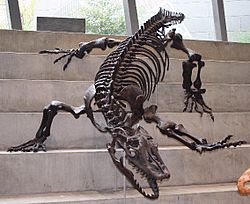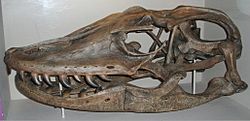Megalania facts for kids
Quick facts for kids MegalaniaTemporal range: Late Pleistocene
|
|
|---|---|
 |
|
| Megalania skeletal reconstruction on Melbourne Museum steps | |
| Scientific classification | |
| Kingdom: | |
| Class: | |
| Order: | |
| Family: | |
| Genus: |
Varanus
|
| Binomial name | |
| Varanus priscus Owen 1859
|
|
Megalania (Varanus prisca) was a giant monitor lizard that lived in southern Australia. It was part of a species of megafauna that lived during the Pleistocene, and appears to have disappeared around 40,000 years ago. The first Aboriginal settlers of Australia may have encountered living Megalania.
Megalania is the land-based lizard known to have existed. Judging from its size, Megalania would have fed mostly upon medium- to large-sized animals, including any of the giant marsupials like Diprotodon .
Size
Ralph Molnar in 2004 determined a range of possible sizes for Megalania. He did this by scaling up from dorsal vertebrae, after he determined a relationship between dorsal vertebrae length and total body length. If it had a long thin tail like the Lace monitor (Varanus varius), then it would have reached a length of 7.9 metres (26 ft). If its tail-to-body proportions were more similar to that of the Komodo dragon, then a length of around 7 metres (23 ft) is more likely. Using 7 m as the maximum length, Molnar estimated the average weight of the lizard at 320 kilograms (710 lb), and 1,940 kilograms (4,280 lb) as the maximum.
This is twice the length of their closest living relative, the Komodo dragon of eastern Indonesia.
Images for kids
See also
 In Spanish: Megalania para niños
In Spanish: Megalania para niños



